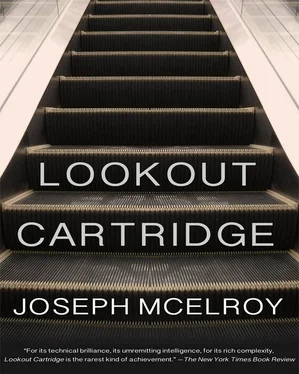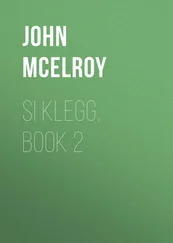Joseph McElroy - Lookout Cartridge
Здесь есть возможность читать онлайн «Joseph McElroy - Lookout Cartridge» весь текст электронной книги совершенно бесплатно (целиком полную версию без сокращений). В некоторых случаях можно слушать аудио, скачать через торрент в формате fb2 и присутствует краткое содержание. Год выпуска: 2014, ISBN: 2014, Издательство: Dzanc Books, Жанр: Современная проза, на английском языке. Описание произведения, (предисловие) а так же отзывы посетителей доступны на портале библиотеки ЛибКат.
- Название:Lookout Cartridge
- Автор:
- Издательство:Dzanc Books
- Жанр:
- Год:2014
- ISBN:9781941088036
- Рейтинг книги:3 / 5. Голосов: 1
-
Избранное:Добавить в избранное
- Отзывы:
-
Ваша оценка:
- 60
- 1
- 2
- 3
- 4
- 5
Lookout Cartridge: краткое содержание, описание и аннотация
Предлагаем к чтению аннотацию, описание, краткое содержание или предисловие (зависит от того, что написал сам автор книги «Lookout Cartridge»). Если вы не нашли необходимую информацию о книге — напишите в комментариях, мы постараемся отыскать её.
Lookout Cartridge — читать онлайн бесплатно полную книгу (весь текст) целиком
Ниже представлен текст книги, разбитый по страницам. Система сохранения места последней прочитанной страницы, позволяет с удобством читать онлайн бесплатно книгу «Lookout Cartridge», без необходимости каждый раз заново искать на чём Вы остановились. Поставьте закладку, и сможете в любой момент перейти на страницу, на которой закончили чтение.
Интервал:
Закладка:
Oh cash, credit, regret, nostalgia — my shtip was more than these. It was more than computable gossip tracing Nash’s nosebleed in its causes and effects or sampling Cosmo’s cold sweat under the eye of a lean-chopped sun-burnished man in a beret staring through the window of that pub on Hampstead High while Dagger’s large, broad shape stood at the bar bending its brown suede elbow patches and making the barmaid laugh — and my shtip was more than some measure of Reid’s utter coolness in the pedestrian tunnel running into a young girl he didn’t really know who gaily linked him to the wife of Gene Flint and asked Reid to sign her cast just where it curved between Dirk Bogarde and W. Cartwright.
No, my shtip might seem to you who have me to have been merely sparked by what you could afford to lose sight of (knowing I would not) — to wit, Graf’s news that Dagger was diversifying in a survival program designed to maintain some of his established ventures (the carton of audio gear and no doubt old maps) yet pushing also to a new job at H.E.W. in white, monumental Washington, and toward new chances in a declining land or at any rate a very tricky economy: but Graf’s words were not themselves the cause of my shtip (not an unexpected absence that like a NAND valve’s zero sets off in the South Ken tunnel conversely a positive pulse in Reid’s temple, for he’d expected someone who is not there); no, these words concerning Dag came as some mere percussion.
Like Savvy or Dudley pasting a Sunday fastball to deep center.
Like Gilda depressing automatically the keys of her brother-in-law’s old cash register (to complete a transaction which went on ending for two or three minutes more between her brother-in-law and florid Father Moran come in person on this Wednesday to face up to what he called after all the one-to-one relationship we so rarely enjoy with the people we do business with, and to complain about the price of glads and chrysanthemums which he said might necessitate breaking his church’s long tradition with its neighborhood florist [such as the neighborhood was] to buy instead from the wholesalers on Sixth Avenue — and then suddenly he was not at all amused despite himself by this Jew from Kew Gardens way the hell out in Queens who expressed the belief that when it came to the flowers of the field not even the Pope could work an economic miracle), but Gilda had sensed as she rang up the priest’s post-dated check that the pair now entering the shop as if in response to the cash register weren’t after flowers — the much heavier man in the beret with bristly thick silver hair who didn’t say a word, and the much younger man, tan and totally bald, with a short sharp nose and fleshy lips, a mean sinewy attractive man who shoved some folded newspapers into the hands of the white-haired man and spoke softly but could never have persuaded Gilda the man they knew she knew whom they were looking for was a friend of theirs — only that the man was Cartwright (she believed that) and she was known to have visited him (she guessed that) at the apartment with the big unmade bed ( I guessed she recalled that ) and he had said he was meeting a mutual friend yesterday but — (Claire, I said) and as Gilda looked at the long brown hand (of Incremona, no guesswork) gripping the top of the register with the thumb-nail so short (news to me) the thumb seemed to be missing half an inch and the fingers coming down over the four white numerals of the priest’s bill, Gilda had a sensation of falling: and not down but forward: and the priest said But you people gild the lily, and her brother-in-law went to close the door left open by the big man in the beret — and when I said to her Wednesday night with a pronounced intimacy pushed into the phone by my lips, Did it give you a shtip (and she said, Where do you know Yiddish), I was saying more than I’d known how to.
For my shtip exemplifies the multiple and parallel sorties which raise our brain above the digital computer to which it is akin; the digital computer works its yes and no operations faster than the brain yet is confined to serial single-file one quest-at-a-time circuit-seeking; but the human natural Body Brain (as my Druid terms it) sends countless of these single files not one at a time but all at once circulating down the deltas, through the gorges and moving targets and (like parties of Indians — Brooklyn, Hindu, Maya, Hollywood or, as the English call the American, Red ) athwart the axes of all pulsing fields.
When the phone rings, Tessa’s father waiting at his dining-room sideboard steps away. Queenie Stone brushes her well-corseted front by me where I stand hungry and dumb at the kitchen doorway. But before she can answer the phone, Jane has come from the living room. At the first ring Tessa has turned from a pot of thick vegetable soup and she pauses at my face which has turned from her father to her; she cannot see her father.
The third ring completes her move to the kitchen table. It wasn’t my face ringing, but the phone. Jane gives her grandfather’s number. The call is for Tessa. Tessa is lifting onto a china platter pieces of mackerel in a jellylike sweet-and-sour sauce. She tells me to tell Dudley to take the call. Across the table set for lunch, I tell Jane this. She has heard her mother.
Leaving the dining room Jane murmurs, It’s Edinburgh.
Will calls out from the living room, We give up!
Jane with her strong oval face and straight hair seems older.
Queenie Stone lays a gold-brocaded white cloth over the chala. Its crust is glossy along glazed arcs of the plaited weave which will seem to disappear when the first slice shows the inside. It is our contribution. Lorna picked it up at our Highgate bakery where the very cheerful women — one of whom is as phony as the English lower middle-class can be — have never sold us a chala before; they are very busy Saturday. Tessa’s father does not answer the phone on the Sabbath. I pull in my stomach and Queenie Stone’s bosom brushes my chest.
Tessa’s father points at the phone receiver on the sideboard. Whoever he is, he’s talking.
Dudley strides into the dining room and without looking at anyone reaches for the phone before it is quite within reach. Tessa’s father does turn the lights on and off on the Sabbath, but when he goes to shul or to Dr. Zeidel’s for tea on the rare Saturdays the Allotts are not here, he travels only by foot. Dudley turns his back to us and says into the phone, Yes?
I did not see Tessa’s father place his black silk silver-brocaded yarmulka on the flat, fine hair that covers the back of his head behind the high receding forehead like a larger yarmulka silver-white. He calls toward the hall that leads to the living room but actually right into Dudley’s neck, We’re ready!
Dudley turns his head as if he has heard something strange. Lorna is heard laughing in the living room.
Dudley puts down the phone, comes around the dinner table to the kitchen door: It’s the chieftain, he says, from Edinburgh.
Tessa says without looking away from the mackerel platter, I’ll call him later. Then, feeling Dudley’s tread move away, she says, It isn’t as if it’s been so long.
Which makes him halt and turn, but he’s several feet into the dining room so it’s me he looks at, not Tessa.
A huge green-and-blue kilt swings in a breeze of Hassidic beards dancing to bells full of wind and whiskey. I move to a place at the table and Dudley brushes me returning to the phone.
When we are all at table, Tessa’s father blesses the bread in Hebrew he learned from Queenie after the war. We are Will, Lorna, Jane, Dudley, Jenny (who is not saying anything today), and now Queenie Stone and Tessa from the kitchen. Tessa’s father uncovers the bread and folds the white-and-gold cloth. He cuts two slices and cuts them into little pieces. He salts each and passes them one by one on the end of the serrated bread knife. We take a sip of Israel Tokay, after all of us except Jenny and Will say l’chayim .
Читать дальшеИнтервал:
Закладка:
Похожие книги на «Lookout Cartridge»
Представляем Вашему вниманию похожие книги на «Lookout Cartridge» списком для выбора. Мы отобрали схожую по названию и смыслу литературу в надежде предоставить читателям больше вариантов отыскать новые, интересные, ещё непрочитанные произведения.
Обсуждение, отзывы о книге «Lookout Cartridge» и просто собственные мнения читателей. Оставьте ваши комментарии, напишите, что Вы думаете о произведении, его смысле или главных героях. Укажите что конкретно понравилось, а что нет, и почему Вы так считаете.












